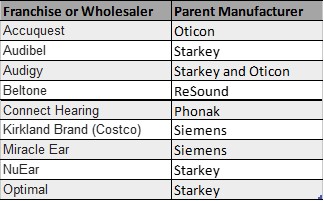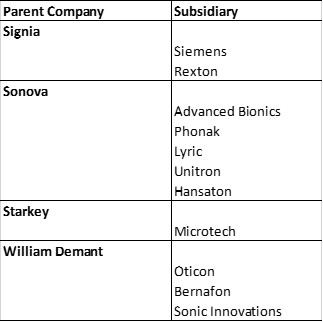Identifying the appropriate health care provider for your hearing needs can be a daunting task. Current advertisements, online articles and newspaper promotions often serve to further confound the situation. Read on for help deciphering the information so you can make the most educated decision for your hearing health care.
Consumers can purchase hearing aids from two different professionals: a doctor of audiology or a hearing aid dispenser. Given the level of education and focus on psychoacoustics, diseases of the ear, varying types and degrees of hearing loss, appropriate intervention options and techniques, and tinnitus (ringing in the ears) evaluation and treatment, audiologists are the leading specialists in aural rehabilitation, which includes hearing aid selection and fitting. However, consumers may not be informed on how to decide where to go for hearing services. Doctors of audiology are typically in a private practice setting while hearing aid dispensers are commonly employed at a franchise (i.e., Beltone, Audibel, Miracle Ear, etc.) or wholesale warehouse (i.e., Sam's Club or Costco). Based on the provider and the location of the services provided, the consumer can expect to receive different hearing aid technology.
There are more than 20 hearing aid manufacturers in the world. Six of those (Oticon, Phonak, ReSound, Siemens, Starkey and Widex) are widely considered to be the leaders of the industry, consistently producing quality products with the most advanced technology and most natural sound quality. Private audiologists are not beholden to any specific manufacturer, which allows patients a variety of options depending on their type and degree of hearing loss and lifestyle demands. Therefore, the audiologist and patient can find the appropriate hearing aid make, model and style for the patient's auditory and lifestyle needs, without restrictions.
Wholesale dealers like Costco as well as franchise companies like Beltone sell hearing devices from various reputable manufacturers that have been relabeled and traditionally have fewer capabilities than their parent company's product. This affects the sound clarity, particularly in the presence of background noise. Additionally, these devices possess a proprietary computer chip, which only allows the hearing aid to be purchased, programmed and repaired by the offices that sell that model. It is also important to understand that manufacturers rarely issue their latest technology to the rebranded, proprietary labels when the technology is first available, and the manufacturers seldom distribute the exact model to the franchise providers.
Additionally, only audiologists are licensed to perform the evaluation for tinnitus and offer treatment and rehabilitation options for this condition. Therefore, the tinnitus features typically integrated into hearing aids are removed from many proprietary or wholesale hearing aids as these devices are traditionally fit by hearing instrument specialists, not audiologists. As a result, the consumer is not only restricted by the dispenser's level of education, but also by the limitations of the modified hearing aid technology.
Unfortunately, the hearing aid industry has made it difficult for an individual with hearing loss to make an educated decision. Franchises and wholesale companies often disguise the fact that most privately owned audiology practices have access to the most reputable hearing aid manufacturers, often with more advanced technology and features. See the list below to better understand which manufacturers supply the wholesale dealers and franchises:
**Phonak also produces proprietary products that contain different technology specific for sale at Sam's and Costco.
Additionally, the following manufacturers are also tied through shared corporate ownership, computer chip technology, research and development and/or production headquarters:
As a private, family-owned audiology practice, Johnson Audiology is able to work with any manufacturer to best meet each patient's individual needs. The practice's patients are not limited to a particular brand, alliance membership or franchise. Moreover, the products issued at franchises are frequently available at Johnson Audiology's clinic but without any limitations (i.e., tinnitus maskers, noise reduction, etc.) or restricted technology levels. When seen at Johnson Audiology, you receive a thorough, professional assessment of your auditory function and needs, allowing for the best and most appropriate hearing instrument selection.
Noteworthy:
Private audiologists are not beholden to any specific manufacturer, which allows patients a variety of available options depending on their type and degree of hearing loss and lifestyle demands.
MORE INFORMATION
For more information about Johnson Audiology or to schedule a consultation, call 423-710-1432 or visit johnsonaudiology.com.


